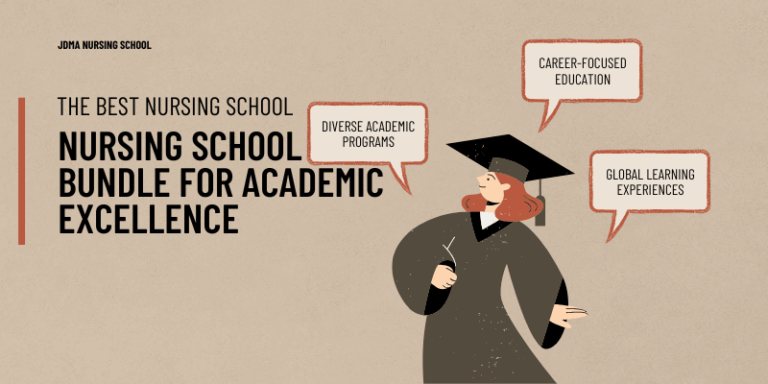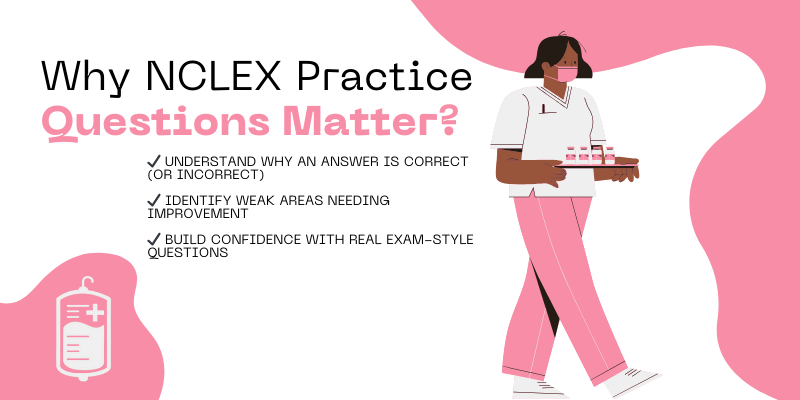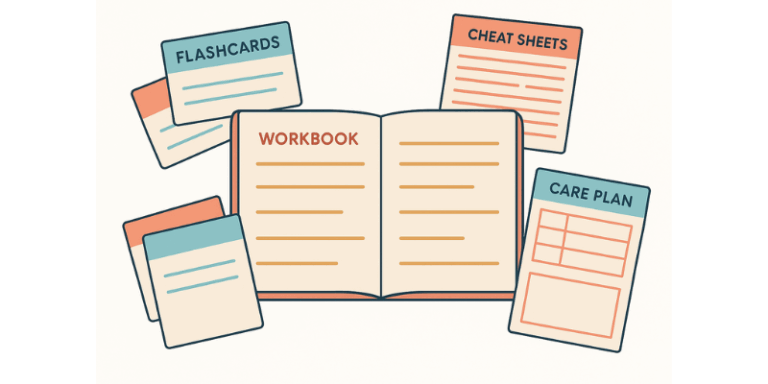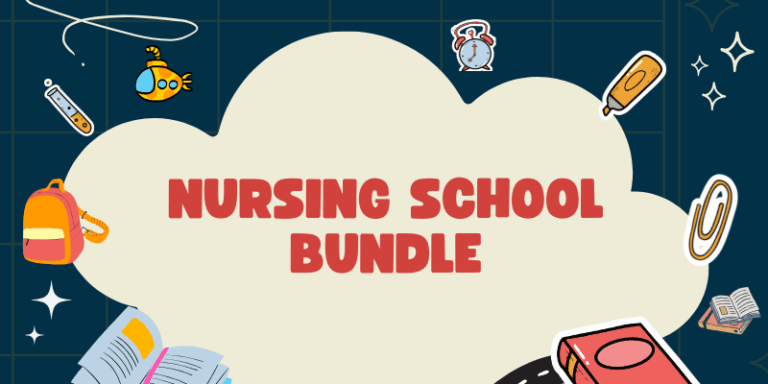
Best Nursing School Bundle for Academic Excellence
Find out which best nursing school bundle ranks best for knowledge retention and test prep. Choose the right bundle for success.

NCLEX exam can be overwhelming, but the right NCLEX practice questions can make all the difference. If you’re studying for the NCLEX RN exam prep or the NCLEX PN review questions, practicing with test questions helps reinforce key concepts and improves test-taking skills.
NCLEX test questions with answers, with complete detailed rationales. We’ll also compare top resources, including free and paid options, to help you find the best NCLEX prep course for your needs. Let’s dive into it!
Did you know that in 2024, the first-time NCLEX-RN pass rate was 88%, while repeat test-takers had a much lower success rate? One of the biggest factors separating those who pass from those who don’t is consistent, high-quality practice.
The Next Gen NCLEX (NGN) has shifted the exam’s focus to better assess clinical judgment through:
Practicing with updated, NGN-style questions helps you develop the critical thinking skills needed to pass. Research shows that students who complete at least 1,500 practice questions before the exam have a significantly higher pass rate.
The NCLEX is designed to test critical thinking and clinical judgment—not just memorization. By using NCLEX practice test with rationales, you’ll:
✔ Understand why an answer is correct (or incorrect)
✔ Identify weak areas needing improvement
✔ Build confidence with real exam-style questions
| Resource | Features | Best For |
| ATI Nursing Blog | 20 free NCLEX-style questions | Quick review |
| Joyce University Blog | Common NCLEX topics explained | Concept reinforcement |
| NCLEX Question Bank 2025 | Updated questions with rationales | Full-length exam simulation |
| Nursing Exam Flashcards | Portable study tool | Memorizing key facts |
| Comprehensive NCLEX Review Bundle | Video lessons + Q&A | In-depth prep |
The purpose of the NCLEX is to ensure that you can practice safety in the face of uncertainty; the boards will be presenting you with random illnesses, symptoms, and medications that you are unlikely to be familiar with. It is not a knowledge test.
| Resource | Features | Rationales | Cost | Link |
| UWorld NCLEX | High-quality questions, visual explanations, performance tracking | ✅ Very detailed | 💰 Paid | uworld.com/nclex |
| Nurse Plus Academy | Free/paid Qbanks, CAT simulator, performance stats | ✅ Explained | 🆓/💰 | nurse.plus/nclex-rn |
| Kaplan NCLEX | Qbank, live classes, test-taking strategies | ✅ In-depth | 💰 Paid | kaptest.com/nclex |
| NCLEX Mastery App | Mobile app, flashcards, quizzes, mnemonics | ✅ Detailed | 💰 Paid | iOS App / Android App |
| SimpleNursing | Video explanations, concept-based learning | ✅ Video-based | 💰 Paid | simplenursing.com |
| RegisteredNursing.org | Topic-based free practice questions with rationales | ✅ Free | 🆓 Free | registerednursing.org |
| NRSNG (Nursing.com) | Full NCLEX prep, visual aids, SIMCLEX adaptive test | ✅ Visual + text | 💰 Paid | nursing.com/nclex |
Every student learns differently that’s why we offer multiple resources to fit your style including nursing study guide.
Comprehensive packages that include practice questions, video reviews, and cheat sheets for structured study.
Q1: A nurse is caring for a client with tuberculosis. Which personal protective equipment (PPE) should the nurse wear?
A) Gloves only
B) Gloves and gown
C) N95 respirator, gloves, and gown
D) Surgical mask and gloves
✅ Correct Answer: C
Rationale: Tuberculosis is airborne, requiring an N95 respirator (or higher) to prevent inhalation of droplet nuclei. Gloves and gown protect against contact with secretions. A surgical mask does not provide adequate protection against airborne pathogens..
Q2: A client is prescribed lisinopril (Zestril) for hypertension. Which adverse effect should the nurse monitor for?
A) Hyperkalemia
B) Hypoglycemia
C) Bradycardia
D) Diarrhea
✅ Correct Answer: A
Rationale: ACE inhibitors (like lisinopril) can cause hyperkalemia due to reduced aldosterone secretion. Hypoglycemia is associated with insulin, bradycardia with beta-blockers, and diarrhea with antibiotics like clindamycin..
Q3: A newborn has a positive Guthrie test. Which condition does this indicate?
A) Phenylketonuria (PKU)
B) Cystic fibrosis
C) Down syndrome
D) Sickle cell anemia
✅ Correct Answer: A
Rationale: The Guthrie test screens for PKU, an inherited disorder causing phenylalanine buildup. Early detection prevents intellectual disability via a phenylalanine-restricted diet..
Q4: A client with schizophrenia says, “The FBI is poisoning my food.” What is the best nursing response?
A) “That’s not true; no one is poisoning you.”
B) “I understand you’re concerned. Let’s talk about it.”
C) “You’re being paranoid.”
D) “Why do you think that?”
✅ Correct Answer: B
Rationale: Therapeutic communication involves acknowledging feelings without reinforcing delusions. Arguing (A, C) increases distrust, while “why” questions (D) can provoke defensiveness..
Q5: A client with heart failure has crackles in the lungs and pitting edema. Which intervention is priority?
A) Administer furosemide (Lasix)
B) Elevate legs
C) Restrict fluids
D) Monitor oxygen saturation
✅ Correct Answer: A
Rationale: Crackles and edema indicate fluid overload. Lasix (a loop diuretic) is the priority to reduce fluid volume. Elevating legs (B) and fluid restriction (C) are supportive measures..
Q6: Which task can the nurse delegate to an unlicensed assistive personnel (UAP)?
A) Administering oral medications
B) Assessing a surgical incision
C) Ambulating a stable post-op client
D) Evaluating pain after morphine
✅ Correct Answer: C
Rationale: UAPs can ambulate stable clients. Medication administration (A), assessments (B), and evaluations (D) require licensed nurse judgment..
Q7: A client with type 1 diabetes has a blood glucose of 55 mg/dL. What should the nurse give first?
A) 4 oz orange juice
B) Glucagon IM
C) Regular insulin
D) Peanut butter crackers
✅ Correct Answer: A
Rationale: For mild hypoglycemia (55 mg/dL), fast-acting carbs (juice) are given first. Glucagon (B) is for severe hypoglycemia if unconscious. Insulin (C) worsens hypoglycemia..
Q8: A client refuses chemotherapy. What should the nurse do?
A) Convince the client to change their mind
B) Document the refusal and notify the provider
C) Withhold information about risks
D) Administer chemo as ordered
✅ Correct Answer: B
Rationale: Informed consent allows clients to refuse treatment. The nurse must document refusal and inform the provider. Coercion (A) violates autonomy..
Q9: A client with vomiting has hypokalemia. Which ECG change should the nurse expect?
A) Peaked T waves
B) ST elevation
C) U waves
D) Prolonged PR interval
✅ Correct Answer: C
Rationale: Hypokalemia causes U waves, muscle weakness, and arrhythmias. Peaked T waves (A) occur in hyperkalemia..
Q10: A client on chemotherapy has a neutrophil count of 400/mm³. Which intervention is priority?
A) Administer filgrastim (Neupogen)
B) Place in protective isolation
C) Monitor for fever
D) Encourage fresh fruits
✅ Correct Answer: B
Rationale: A neutrophil count <500/mm³ indicates severe neutropenia, requiring protective isolation to prevent infection. Neupogen (A) stimulates WBC production but is not immediate..
Q11: In the ER, which client should the nurse assess first?
A) A child with a fever of 101°F (38.3°C)
B) An adult with chest pain and diaphoresis
C) A teenager with a sprained ankle
D) An elderly client with chronic back pain
✅ Correct Answer: B
Rationale: Chest pain with diaphoresis suggests acute myocardial infarction (AMI), a life-threatening condition requiring immediate intervention (e.g., ECG, aspirin, nitro). Fever (A) and sprains (C) are lower priority..
Q12: A 2-month-old infant is due for vaccinations. Which vaccine is contraindicated if the child has a severe egg allergy?
A) Hepatitis B (HepB)
B) Inactivated polio vaccine (IPV)
C) Rotavirus (RV)
D) Influenza (Flu)
✅ Correct Answer: D
Rationale: Influenza vaccines are cultured in eggs and may trigger anaphylaxis in egg-allergic patients. HepB (A), IPV (B), and RV (C) are safe..
Q13: A client on warfarin (Coumadin) has an INR of 6.0. Which action is priority?
A) Administer vitamin K
B) Hold the next dose
C) Assess for bleeding
D) Increase fluid intake
✅ Correct Answer: A
Rationale: An INR >5.0 indicates high bleeding risk. Vitamin K reverses warfarin’s effects. Holding the dose (B) is insufficient; bleeding assessment (C) is ongoing but not the first action..
Q14: A client says, “I’d be better off dead.” What is the nurse’s best response?
A) “You don’t really mean that.”
B) “Are you thinking of harming yourself?”
C) “Let’s talk about something positive.”
D) “Things will get better.”
✅ Correct Answer: B
Rationale: Directly assessing suicide risk is critical. Avoid dismissive statements (A, C, D). Ask open-ended but specific questions to evaluate intent..
Q15: A pregnant client at 32 weeks has BP 160/110 mmHg, proteinuria, and headache. Which intervention is priority?
A) Administer magnesium sulfate
B) Place in Trendelenburg position
C) Restrict fluid intake
D) Prepare for vaginal delivery
✅ Correct Answer: A
Rationale: This client has severe preeclampsia. Magnesium sulfate prevents seizures (eclampsia). Delivery (D) may be needed but is not the immediate action. Trendelenburg (B) worsens hypertension..
Q16: A client with head trauma has polyuria (4L/day) and serum sodium 155 mEq/L. Which medication should the nurse anticipate?
A) Desmopressin (DDAVP)
B) Furosemide (Lasix)
C) Metformin (Glucophage)
D) Levothyroxine (Synthroid)
✅ Correct Answer: A
Rationale: Diabetes insipidus (caused by ADH deficiency) leads to dilute polyuria and hypernatremia. DDAVP replaces ADH. Lasix (B) worsens dehydration..
Q17: A client with terminal cancer refuses further treatment. The family insists on chemotherapy. What should the nurse do?
A) Support the client’s decision
B) Advocate for the family’s wishes
C) Delay documentation until consensus
D) Contact the hospital lawyer
✅ Correct Answer: A
Rationale: Autonomy allows clients to refuse treatment. The nurse must honor the client’s wishes, even if the family disagrees..
Q18: A post-op client has redness, warmth, and purulent drainage at the incision site. Which action is priority?
A) Culture the wound
B) Administer PRN acetaminophen
C) Notify the surgeon
D) Apply a warm compress
✅ Correct Answer: C
Rationale: Purulent drainage + redness/warmth suggest surgical site infection (SSI), requiring immediate provider notification for antibiotics or debridement..
Q19: An elderly client takes digoxin, furosemide, and lisinopril. Which symptom indicates digoxin toxicity?
A) Tinnitus
B) Blurred vision (yellow halos)
C) Dry cough
D) Muscle cramps
✅ Correct Answer: B
Rationale: Digoxin toxicity causes visual disturbances (yellow/green halos), nausea, and arrhythmias. Tinnitus (A) is linked to aspirin; cough (C) to ACE inhibitors..
Q20: Which task is appropriate to delegate to an LPN?
A) Initiate blood transfusion
B) Perform a sterile dressing change
C) Assess a new admission
D) Develop a care plan
✅ Correct Answer: B
Rationale: LPNs can perform sterile procedures under RN supervision. Blood transfusions (A), assessments (C), and care plans (D) require an RN..
Q21: A client with acute respiratory distress syndrome (ARDS) is on mechanical ventilation. Which setting should the nurse anticipate?
A) Low PEEP
B) High tidal volume (10-12 mL/kg)
C) Low FiO2
D) High PEEP
✅ Correct Answer: D
Rationale: ARDS requires high PEEP to prevent alveolar collapse. Low tidal volumes (6-8 mL/kg) reduce barotrauma (B is wrong). FiO2 depends on oxygenation needs (C)..
Q22: A 6-year-old collapses. The nurse notes no pulse. What is the correct compression-to-ventilation ratio?
A) 30:2
B) 15:2
C) 5:1
D) Continuous compressions
✅ Correct Answer: B
Rationale: For pediatric CPR, use 15 compressions : 2 breaths (if two rescuers). For adults, it’s 30:2 (A)..
Q23: A nurse spills IV vincristine. Which action is priority?
A) Wipe with a paper towel
B) Use a chemotherapy spill kit
C) Rinse with water
D) Notify housekeeping
✅ Correct Answer: B
Rationale: Chemo spills require special kits (with absorbent pads and PPE) to avoid exposure. Water (C) spreads hazardous drugs..
Q24: A client with bipolar disorder is hyperverbal and agitated. Which intervention takes priority?
A) Provide a quiet environment
B) Encourage group therapy
C) Administer lithium
D) Restrain the client
✅ Correct Answer: A
Rationale: Decrease stimulation to prevent escalation. Lithium (C) is long-term; restraints (D) are last-resort..
Q25: A client 2 hours postpartum has saturated a pad in 15 minutes. Which action is first?
A) Massage the fundus
B) Administer oxytocin
C) Prepare for surgery
D) Assess blood pressure
✅ Correct Answer: A
Rationale: Boggy uterus + heavy bleeding = uterine atony. Fundal massage is the first-line intervention to stimulate contractions..
These responses are AI-generated; for more reference, try reddit student suggestions, as they are much more accurate than what we present..
Use a NCLEX question bank 2025 for updated content. Review detailed NCLEX answer explanations to avoid repeating mistakes. Take timed practice NCLEX for nursing students to improve speed.
Tags

Find out which best nursing school bundle ranks best for knowledge retention and test prep. Choose the right bundle for success.

Complete nursing school workbook bundle! Includes flashcards for nursing students, cheat sheets, dosage calculation practice, and more.

Get the instant-download Printable Nursing School Bundle—packed with study guides, cheat sheets, NCLEX prep, and digital planners.
By subscribing to our newsletter you agree to our Terms and Conditions and Privacy Policy